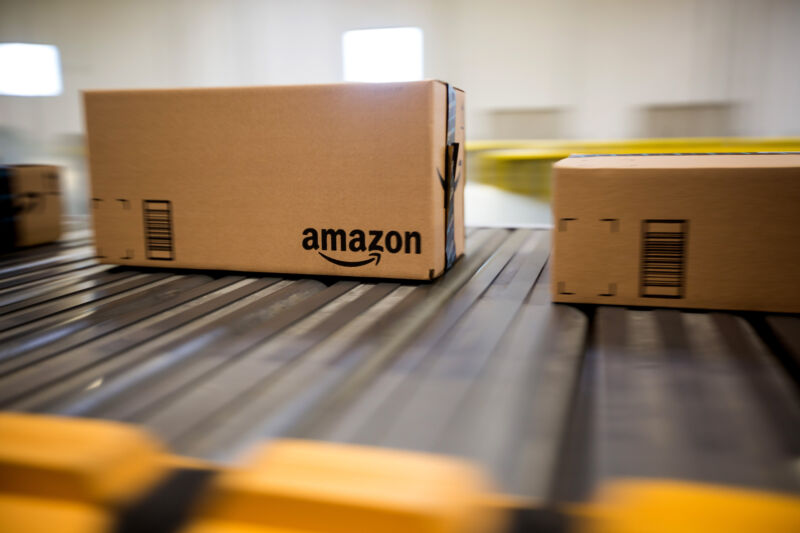
Amazon and a who’s who of online-only retailers are trying to kill proposed federal and state legislation that would make the companies disclose contact information for third-party sellers.
The bills would force Amazon and others to verify the identities of third-party sellers and provide consumers with ways to contact the stores. The proposed legislation is pitting brick-and-mortar retailers—including Home Depot, Walgreens, and JC Penney, which support the bills—against online retailers like Amazon, Etsy, eBay, Poshmark, and others, which argue that the legislation would harm small sellers.
The bills come as brick-and-mortar retailers lost ground to online retailers throughout the pandemic—in 2020, 20 percent of consumer retail purchases were made online, compared with about 14 percent in 2019. But the legislation is also being proposed in response to a slew of counterfeit, stolen, and dangerous items that have appeared on marketplace sites.
The online retailers argue that the bills would compromise the privacy of third-party sellers. On some platforms, the majority of merchants run their businesses out of their homes. Etsy, for example, says 97 percent of its sellers do. A survey of Amazon sellers found that 70 percent have work outside of their Amazon businesses, suggesting that they, too, run the business from their homes.
“When you look at the unintended consequences of sellers trying to choose between their privacy and their safety and their livelihood, the result is you’re going to have fewer sellers online—and that really just benefits the Walmarts and Home Depots and the Lowes,” Alexis Marvel, a spokesperson for the Makers and Merchants Coalition, told Axios.
Cover for fraudsters
That anonymity, though, provides cover for fraudsters. It’s not uncommon to find counterfeit and potentially harmful items on marketplace sites. In 2018, the Government Accountability Office ordered 47 items, including shoes, travel mugs, cosmetics, and phone chargers, from third-party sellers on “popular consumer websites” and determined that 20 of them were counterfeit.
Even non-counterfeit items bought from third-party sellers have been implicated in consumer harm. In April 2018, a 19-month-old in Texas was injured after ingesting a battery that fell out of a loose battery compartment in a third-party Apple TV remote. The parents asked Amazon to stop selling the defective product and requested contact information for Hu Xi Jie, who ran the Amazon store “USA Shopping 7693” that sold the remote. Hu Xi Jie never responded, and Amazon was not able to locate the individual. The parents sued Amazon in Texas state court, arguing that the retailer is liable for the defective product. Amazon, on the other hand, says it serves as a middleman and bears no liability.It’s that argument, among others, that has brick-and-mortar retailers pushing for changes. Consumer product laws hold businesses like Target and Home Depot liable for injuries if the stores do not take sufficient measures to keep defective products from reaching consumers. Online marketplaces haven’t been subject to those rules since they don’t control third-party sellers.
That doesn’t mean Amazon hasn’t felt pressure to address the issue. Last month, the company issued a report stating that it had “seized and destroyed” more than 2 million counterfeit products sent to its warehouses last year. To fight counterfeiters, Amazon said it introduced a new seller verification system that “connects one-on-one with prospective sellers through a video chat or in person at an Amazon office to verify sellers’ identities and government-issued documentation.”
Taking sides
Online retailers have formed two groups to fight the bills. One was started just six weeks ago and calls itself the Makers and Merchants Coalition. It’s funded by the Internet Association, which is supported by a range of companies, including retailers Amazon, Etsy, and Rakuten, and other Internet-related companies including PayPal, Google, and Microsoft. The other, the Coalition to Protect America’s Small Sellers, was started 10 weeks ago by platforms including eBay, Etsy, and Poshmark, which sell items exclusively from third parties.On the other side, physical retailers have formed the Buy Safe America Coalition, which includes Home Depot, Lowes, Walgreens, CVS, and others.
No fewer than 17 states have proposed legislation to push online retailers to offer more transparency about third-party sellers. Federal legislation has been proposed, too. In March, Sen. Richard Durbin (D-Ill.) and Sen. Bill Cassidy (R-La.) introduced the INFORM Consumers Act and recently attempted to include it as an amendment to the United States Innovation and Competition Act. That effort failed, though the bill remains before the Senate.
reader comments
210